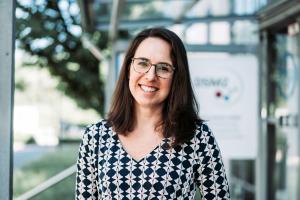Dr Amber Hartman Scholz selected for Steering Committee of Multilateral Mechanism on Digital Sequence Information/UN CBD
BRAUNSCHWEIG, GERMANY, April 28, 2025 /EINPresswire.com/ -- Dr. Amber Hartman Scholz, Head of the Department of Science Policy and Internationalization at the Leibniz Institute DSMZ-German Culture Collection of Microorganisms and Cell Cultures GmbH, has been selected to represent scientific institutions on the Steering Committee of the Multilateral Mechanism for the Fair and Equitable Sharing of Benefits from the Use of Digital Sequence Information on Genetic Resources (MLM) - including a Global Fund. The Contracting Parties to the UN Convention on Biological Diversity (CBD) established this new international mechanism in 2022 (Decision 15/9) and agreed on its modalities (Decision 16/2) at their 16th meeting (COP16), in Cali, Colombia, in 2024. The MLM aims to fund global efforts on biodiversity conservation by sharing the monetary and non-monetary benefits generated by the use of Digital Sequence Information (DSI), publicly available on global databases. DSI is a policy term referring to genetic sequence data and other related digital biological data such as DNA, RNA, protein and metabolite data.
Secretariat of the Convention on Biological Diversity
The Secretariat of the Convention on Biological Diversity (SCBD) received 95 nominations for the Steering Committee. These included 46 individuals nominated by 37 parties, 16 from Indigenous Peoples and local communities, as well as 32 from observers across various sectors: 11 from the scientific community, six from the private sector, 14 from civil society, and one from another UN organization. The Steering Committee will oversee the operations of the Cali Fund, ensuring the fair and equitable disbursement of funds. It will also provide guidance to the SCBD, report to the Conference of the Parties (COP) and advise on the development of methodologies to assess the mechanism's effectiveness, including the establishment of indicators aligned with the Kunming-Montreal Global Biodiversity Framework that aims to halt and reverse nature loss. A DSMZ-led /ET-NMBS project has already contributed towards the establishment of such indicators (https://doi.org/10.1093/biosci/biae132).
Open Digital Sequence Information
At COP16, a major victory for the academic sector was the alignment of the mechanism with the open and unrestricted way in which scientists access and use Digital Sequence Information. This alignment ensures that biodiversity genetic data and other molecular data will remain accessible for public research purposes without major disruptions to the scientific ecosystem (https://doi.org/10.1016/j.patter.2025.101208).
Press contact:
PhDr. Sven-David Müller, Head of Public Relations, Leibniz Institute DSMZ-German Collection of Microorganisms and Cell Cultures GmbH
Phone: ++49 (0)531/2616-300
Mail: press@dsmz.de
About the Leibniz Institute DSMZ
The Leibniz Institute DSMZ-German Collection of Microorganisms and Cell Cultures is the world's most diverse collection of biological resources (bacteria, archaea, protists, yeasts, fungi, bacteriophages, plant viruses, genomic bacterial DNA as well as human and animal cell lines). Microorganisms and cell cultures are collected, investigated and archived at the DSMZ. As an institution of the Leibniz Association, the DSMZ with its extensive scientific services and biological resources has been a global partner for research, science and industry since 1969. The DSMZ was the first registered collection in Europe (Regulation (EU) No. 511/2014) and is certified according to the quality standard ISO 9001:2015. As a patent depository, it offers the only possibility in Germany to deposit biological material in accordance with the requirements of the Budapest Treaty. In addition to scientific services, research is the second pillar of the DSMZ. The institute, located on the Science Campus Braunschweig-Süd, accommodates more than 90,000 bioresources and has almost 230 employees. www.dsmz.de
The Leibniz Association
The Leibniz Association connects 96 independent research institutions that range in focus from natural, engineering and environmental sciences to economics, spatial and social sciences and the humanities. Leibniz Institutes address issues of social, economic and ecological relevance. They conduct basic and applied research, including in the interdisciplinary Leibniz Research Alliances, maintain scientific infrastructure, and provide research-based services. The Leibniz Association identifies focus areas for knowledge transfer, particularly with the Leibniz research museums. It advises and informs policymakers, science, industry and the public. Leibniz institutions collaborate intensively with universities – including in the form of Leibniz ScienceCampi – as well as with industry and other partners at home and abroad. They are subject to a transparent, independent evaluation procedure. Because of their importance for the country as a whole, the Leibniz Association Institutes are funded jointly by Germany’s central and regional governments. The Leibniz Institutes employ around 21,400 people, including 12,170 researchers. The financial volume amounts to 2,3 billion euros. www.leibniz-gemeinschaft.de
Sven David Mueller
Leibniz Institute DSMZ
email us here
Visit us on social media:
LinkedIn
Instagram
Facebook
YouTube
Legal Disclaimer:
EIN Presswire provides this news content "as is" without warranty of any kind. We do not accept any responsibility or liability for the accuracy, content, images, videos, licenses, completeness, legality, or reliability of the information contained in this article. If you have any complaints or copyright issues related to this article, kindly contact the author above.
Wytrwal Industries Celebrates 250 years of the U.S. Army
WHAT by Anthony Prebor Expands the Acclaimed ?: QUESTION Mystery Series
DRML Miner Expands Cloud Mining Services with Sustainable Infrastructure and Flexible Contracts
Kalendarium
Więcej ważnych informacji
 Jedynka Newserii
Jedynka Newserii

 Jedynka Newserii
Jedynka Newserii

Prawo

Trwają dyskusje nad kształtem unijnego budżetu na lata 2028–2034. Mogą być rozbieżności w kwestii Funduszu Spójności czy dopłat dla rolników
Trwają prace nad wieloletnimi unijnymi ramami finansowymi (WRF), które określą priorytety wydatków UE na lata 2028–2034. W maju Parlament Europejski przegłosował rezolucję w sprawie swojego stanowiska w tej sprawie. Postulaty europarlamentarzystów mają zostać uwzględnione we wniosku Komisji Europejskiej w sprawie WRF, który zostanie opublikowany w lipcu 2025 roku. Wciąż jednak nie ma zgody miedzy państwami członkowskimi, m.in. w zakresie Funduszu Spójności czy budżetu na rolnictwo.
Konsument
35 proc. gospodarstw domowych nie stać na zakup mieszkania nawet na kredyt. Pomóc może wsparcie budownictwa społecznego i uwolnienie gruntów pod zabudowę

W Polsce co roku oddaje się do użytku ok. 200 tys. mieszkań, co oznacza, że w ciągu dekady teoretycznie potrzeby mieszkaniowe społeczeństwa mogłyby zostać zaspokojone. Jednak większość lokali budują deweloperzy na sprzedaż, a 35 proc. gospodarstw domowych nie stać na zakup nawet za pomocą kredytu. Jednocześnie ta grupa zarabia za dużo, by korzystać z mieszkania socjalnego i komunalnego. Zdaniem prof. Bartłomieja Marony z UEK zmniejszeniu skali problemu zaradzić może wyłącznie większa skala budownictwa społecznego zamiast wspierania kolejnymi programami zaciągania kredytów.
Problemy społeczne
Hejt w sieci dotyka coraz więcej dzieci w wieku szkolnym. Rzadko mówią o tym dorosłym

Coraz większa grupa dzieci zaczyna korzystać z internetu już w wieku siedmiu–ośmiu lat – wynika z raportu NASK „Nastolatki 3.0”. Wtedy też stykają się po raz pierwszy z hejtem, którego jest coraz więcej w mediach społecznościowych. Według raportu NASK ponad 2/3 młodych internautów uważa, że mowa nienawiści jest największym problemem w sieci. Co więcej, dzieci rzadko mówią o takich incydentach dorosłym, dlatego tym istotniejsze są narzędzia technologiczne służące ochronie najmłodszych.
Partner serwisu
Szkolenia

Akademia Newserii
Akademia Newserii to projekt, w ramach którego najlepsi polscy dziennikarze biznesowi, giełdowi oraz lifestylowi, a także szkoleniowcy z wieloletnim doświadczeniem dzielą się swoją wiedzą nt. pracy z mediami.









.gif)



